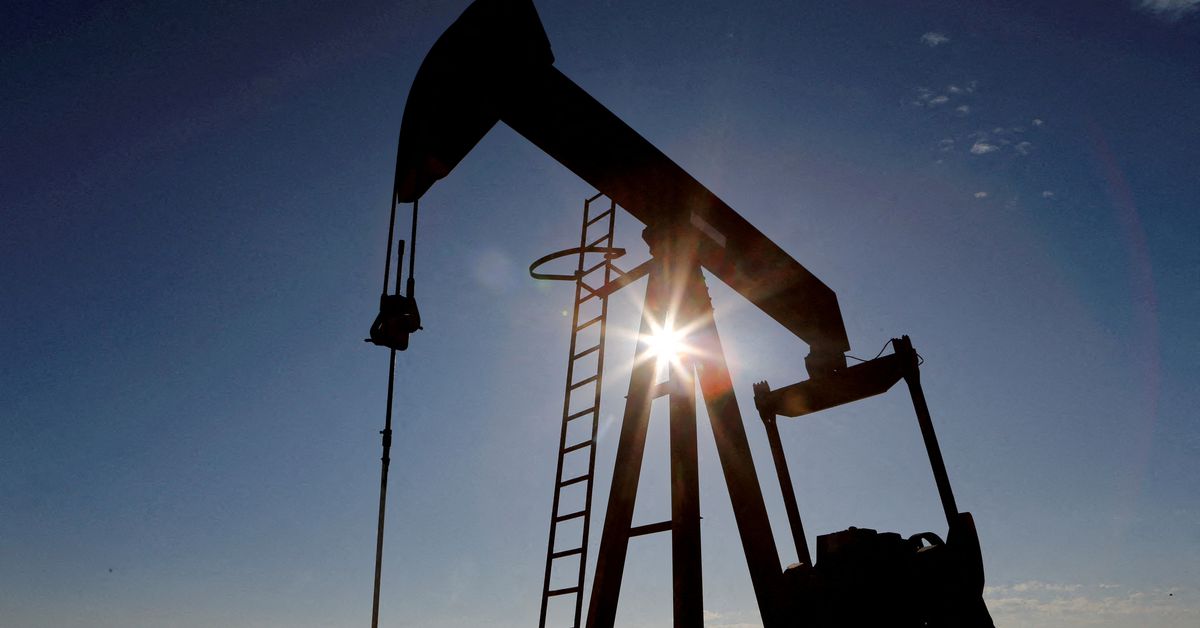
The sun behind a crane pumping crude oil in the Permian Basin in Loving County, Texas, United States, November 22, 2019. REUTERS/Angus Mordant // File Photo
Register now to get free unlimited access to Reuters.com
LONDON (Reuters) – Oil prices stabilized on Monday after hitting their highest levels in more than seven years, amid fears that a possible Russian invasion of Ukraine could lead to US and European sanctions that could disrupt exports of one of the world’s largest oil producers. producers.
Brent crude was down 12 cents, or 0.1 percent, at $94.32 a barrel by 0844 GMT, after earlier hitting a peak at $96.16, its highest since October 2014.
US West Texas Intermediate crude rose 1 cent, or less than 0.1 percent, to $93.11 a barrel, hovering near a session high of $94.94, the highest since September 2014.
Register now to get free unlimited access to Reuters.com
Comments from the United States about an imminent attack by Russia on Ukraine have shaken global financial markets.
The United States said on Sunday that Russia could invade Ukraine at any time and could create a sudden pretext for an attack. Read more
“If there is a movement of forces, then Brent crude will have no problem rising above $100,” OANDA analyst Edward Moya said in a note.
“Oil prices will remain very volatile and sensitive to increased updates regarding the situation in Ukraine.”
The tensions come as the Organization of the Petroleum Exporting Countries (OPEC) and its allies, a group known as OPEC+, struggle to raise production despite monthly pledges to raise output by 400,000 barrels per day until March.
While geopolitical tensions help add to the bullish view, this oil giant’s cycle is fundamentally driven, said RBC Capital analysts.
“We see a price rally to touch or flirt $115 a barrel or higher this summer,” analyst Mike Tran said in a note.
The International Energy Agency said the gap between OPEC+ production and its target widened to 900,000 bpd in January, while JPMorgan said the gap for OPEC alone was 1.2 million bpd. Read more
“We are noticing signs of tension across the group: seven members of OPEC-10 failed to meet quota increases for the month with the largest deficits shown by Iraq,” JPMorgan analysts said in a note on Feb. 11.
The bank added that the super-cycle is in full swing with “oil prices likely to exceed $125 per barrel as the excess capacity risk premium increases.”
Investors are also watching talks between the United States and Iran to revive the 2015 nuclear deal.
Iran’s Foreign Ministry spokesman said on Monday during a press conference in Tehran that the talks had not reached a dead end, although a senior Iranian security official said earlier that progress in the talks had become “more difficult”. Read more
Baker Hughes Energy Services said on Friday that strong oil prices in the United States are encouraging energy companies to increase production as it added the most oil rigs in four years last week. Read more
Register now to get free unlimited access to Reuters.com
Additional reporting by Bozorgmehr Sharafuddin in Lonoden and Florence Tan in Singapore; Editing by Kenneth Maxwell and Kim Coogill
Our criteria: Thomson Reuters Trust Principles.

“Avid problem solver. Extreme social media junkie. Beer buff. Coffee guru. Internet geek. Travel ninja.”





More Stories
“Recycling – Changing the water heater”: the possibility of paying the financing to the institution once or partially
Libya: US General Meets Haftar Amid Tensions Between Governments
New tax exemption package and incentives for business and corporate mergers..